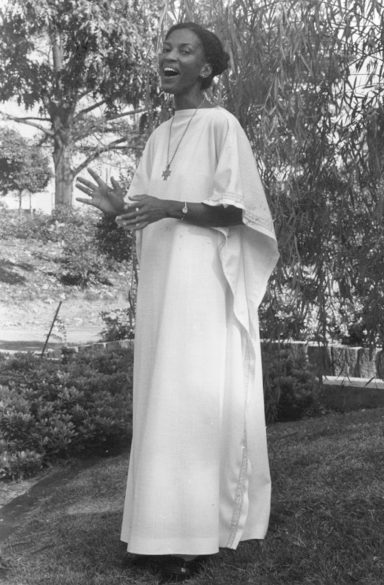
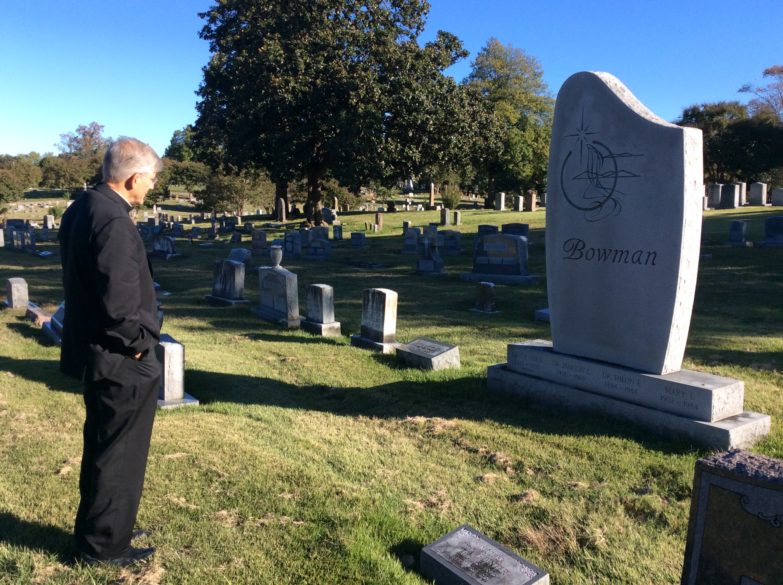


By Catholic News Service
BALTIMORE – The U.S. bishops spotlighted two major initiatives focused on the central role of the Eucharist Nov. 17, the second of two days of public sessions of their fall general assembly.
The U.S. Conference of Catholic Bishops approved a 26-page statement, “The Mystery of the Eucharist in the Life of the Church,” with 222 “yes” votes, and also OK’d plans for a three-year National Eucharistic Revival that will culminate with the National Eucharistic Congress 2024 in Indianapolis.
On other matters, they were invited to take a multicultural journey with young Catholics to Chicago next June; were urged to implement a framework for marriage and family ministry that they had approved at their spring assembly in June; agreed to begin review of the “Charter for the Protection of Children and Young People” earlier than planned; and heard how the pandemic may have slowed but not stopped a pro-life initiative called “Walking With Moms in Need.”
They approved guidelines governing the USCCB’s financial investments that include wider limits on where money would be invested. The guidelines advance a policy of engagement on corporate practices that impact human dignity.
The prelates, meeting in person for a national gathering for the first time since 2019, also approved guidelines for the exposition of the Eucharist and Benediction, affirmed sainthood causes for three U.S. laypeople, approve revisions of statutes for the catechumenate and voted for revised English- and Spanish-language editions of the Order of Christian Initiation of Adults.
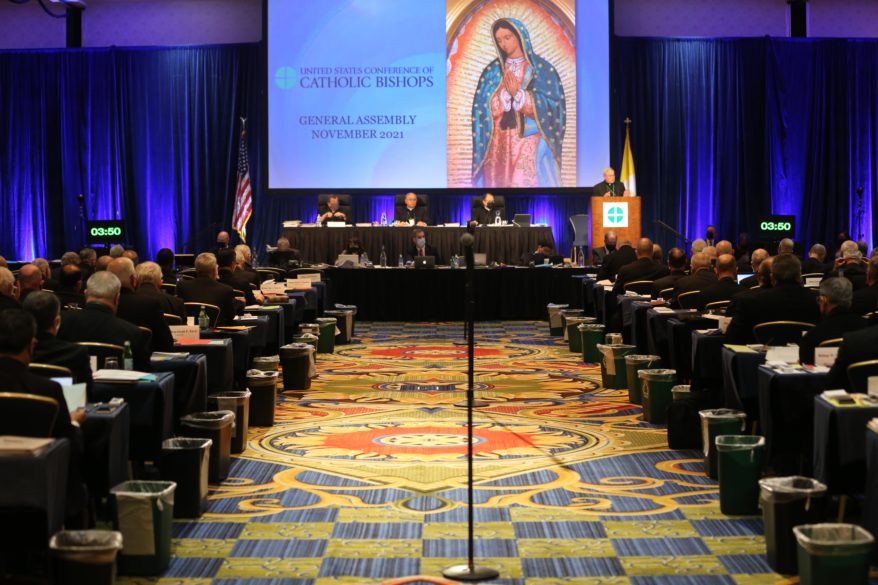
The bishops assigned a feast date to St. Teresa of Kolkata – Sept. 5, the death date in 1997 for the founder of the Missionaries of Charity. It will be an optional memorial on the U.S. liturgical calendar.
Their vote on the Eucharist statement came a day after their discussion of the document – a discussion that was markedly different than their debate in June about what it could potentially contain, namely a call for President Joe Biden and Catholic politicians who support abortion to be denied Communion. But the final document had nothing like that and is addressed to all Catholics in the United States.
It “endeavors to explain the centrality of the Eucharist in the life of the church,” said Bishop Kevin C. Rhoades of Fort Wayne-South Bend, Indiana, chairman of the bishops’ doctrine committee, in a short presentation on the statement Nov. 16. It “addresses the fundamental doctrine about the Eucharist that the church needs to retrieve and revive.”
Even bigger than the statement is the plan for the three-year eucharistic revival, ending with the National Eucharistic Congress 2024 in Indianapolis. The bishops approved it 201-17, with five abstentions.
The revival will officially start on the feast of Corpus Christi, June 16, 2022, with a diocesan focus that will include eucharistic processions and other events of adoration and prayer around the country. In 2023, the emphasis will be on parishes and resources aimed at increasing Catholics’ understanding of what the Eucharist really means.
As chairman of the bishops’ Committee on Evangelization and Catechesis, Auxiliary Bishop Andrew H. Cozzens of St. Paul and Minneapolis, who was recently named bishop of Crookston, Minnesota, gave the bishops details about this planned revival just before they voted on it.
The revival could be a time of healing for the entire church, he said, as well as a movement of evangelization and a reawakening of understanding of the sacrament of the Eucharist for Catholics across the country.
Philadelphia Archbishop Nelson J. Pérez invited fellow bishops to a national gathering in Chicago in June to participate with young Catholics in a dialogue about issues of culture, racism and inclusion through the prism of faith.
“Perhaps it was the Holy Spirit’s way of telling us bishops that we really needed to take time to listen to young people, those who minister to them and, especially, those who are in the peripheries, feeling unimportant and unloved, and often alienated from the church,” Archbishop Pérez said Nov. 17. He is chairman of the bishops’ Committee on Cultural Diversity in the Church.
He detailed the opportunity the coronavirus pandemic has provided in facilitating virtual gatherings between young Catholics and bishops over the last year and a half. More than 60 bishops have joined virtual gatherings as part of a process called “Journeying Together,” he said.
The gatherings have taken place online in the midst of a pandemic, under “social unrest, racial reckoning, and the polarization affecting U.S. society,” he said. The process created “an opportunity for bishops, young adults, youth ministers and campus ministers, and leaders of various other ministries with young people, to engage in respectful yet honest dialogue in matters of faith, culture, racism, inclusion and the issues that affect them as young people,” he explained.
The chairman of the U.S. bishops’ Committee on Laity, Marriage, Family Life and Youth called on his fellow bishops to work “in every way possible” to implement the national pastoral framework for marriage and family ministry that they approved in June.
Archbishop Salvatore J. Cordileone of San Francisco said that addressing marriage and family life is vital in a time when families are under increasing threats from “sweeping ideological currents that destroy and undermine our sexual identity as man and woman and God-given vocations as father and mother, son or daughter.” Bolstering marriage and family ministry is an appropriate undertaking to start during the “Amoris Laetitia Family Year,” declared by Pope Francis, the archbishop said.
Titled “Called to the Joy of Love: A Pastoral Framework for Marriage and Family Life Ministry,” the document can serve as a practical guidebook to serve couples and families because it offers an adaptable set of principles and strategies for pastoral care, he said.
Archbishop Joseph F. Naumann of Kansas City, Kansas, chairman of the bishops’ Committee on Pro-Life Activities, told his fellow bishops that the Secretariat for Pro-Life Activities’ “Walking with Moms in Need” initiative may have been slowed by the coronavirus pandemic, but it has by no means stopped helping expectant mothers from any walk of life. It was launched March 25, 2020, just as the pandemic began to take hold.
This initiative “has the capacity to take what is often seen as a partisan divide and transform it into pastoral unity, bridging the divide between Catholics who describe themselves using the labels of ‘pro-life’ or ‘social justice,'” he said. “The vision of WWMIN is that a pregnant or parenting mother in need can turn to any local Catholic parish and be connected with the life-affirming assistance and accompaniment that she needs.”
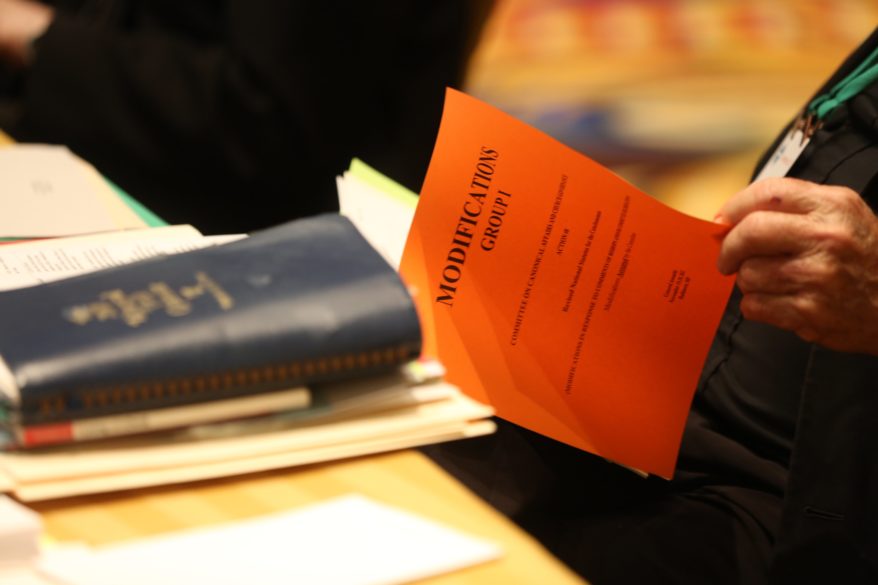
The initiative’s website is WalkingWithMoms.com.
In presentations at end of the Nov. 17 public session:
– Anna Gallagher, executive director of the Catholic Legal Immigration Network, told the bishops 3 million to 11 million people in the U.S. could soon benefit from some type of immigration reform.
– Auxiliary Bishop Mario E. Dorsonville of Washington, chairman of the USCCB’s migration committee, asked his fellow prelates to advocate, pray and walk with immigrants in their respective dioceses.
– From Haiti to Afghanistan, the work of Catholic Relief Services has focused on responding to the impact of climate change, natural disasters such as earthquakes, hunger, meager farm production and developing education for children, reported Bishop Frank J. Caggiano of Bridgeport, Connecticut, president of the CRS board of directors. He gave the presentation with Sean Callahan, CRS president and CEO.
– Dominican Sister Donna Markham, president and CEO of Catholic Charities USA, told the bishops the national network of Catholic Charities agencies had provided $5.1 billion in assistance in the last year, much of it connected to the economic fallout caused by the COVID-19 pandemic.
– The synodal process the church is entering into is meant to show that “no one is unimportant in this time of listening,” said Bishop Daniel E. Flores of Brownsville, Texas. The bishop, a member of the USCCB’s Committee on Doctrine and voted its chairman-elect during the assembly, said the process over the next seven months must involve the participation of the whole church “listening together, praying together, discerning together.”
At sunrise Nov. 18 outside the hotel where the bishops held their assembly, Cardinal Joseph W. Tobin of Newark, New Jersey, Boston Cardinal Seán P. O’Malley and six other Catholic prelates joined survivors of sex abuse, some the victims of clergy in an invitation-only walk to pray for an end to the “evil” of abuse and call for a day of prayer for survivors and an end to the abuse.
(Contributing to this story were Carol Zimmermann, Dennis Sadowski, Rhina Guidos and Mark Pattison.)
By Tereza Ma
MERIDIAN – Sunday, Nov. 21 was a special day for the parishes of St. Patrick and St. Joseph in Meridian. After two years the parishes were able to celebrate with their annual Thanksgiving feast and were joined by Bishop Joseph Kopacz, also celebrating the feast of Christ the King at Mass with Father Augustine Palimattam.
Parishioners were thankful for many things. Here are a few of their responses:
– Valeria Rangel is thankful for the Spanish and English speaking parishioners to get together as community. “Even though we have different Mass times, speak in different languages and have different cultures, it is wonderful to come together.”
– For Ken Woodward the dinner was a renewal of the community. “It leads us to Christ because we are the body of Christ. On this day as we honor him as King of Kings, what better way to do it than enjoying community with our brothers and sisters and enjoy a meal together.”
– Lucila Vargas, originally from Columbia, has been a member of St. Patrick for 46 years. She has enjoyed the tradition of the parish gathering to give thanks and enjoy a meal, as in her home country “they normally just go to church and give thanks to the Lord.”
– Dorethea Cole of St. Joseph parish loves the way that both parishes “get together as one Catholic community.”
– Tina Nadeau traveled 1,450 miles from South Dakota by motorcycle for the event to spend her mom’s birthday with her and enjoy Thanksgiving together with her mother and stepdad, who cooked for the parish feast. “It is so special to be here and give thanks.”
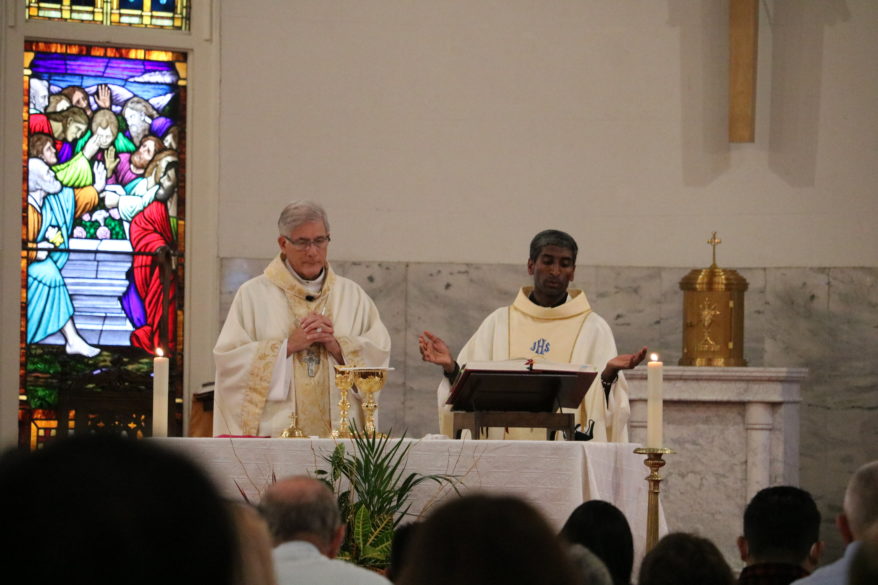
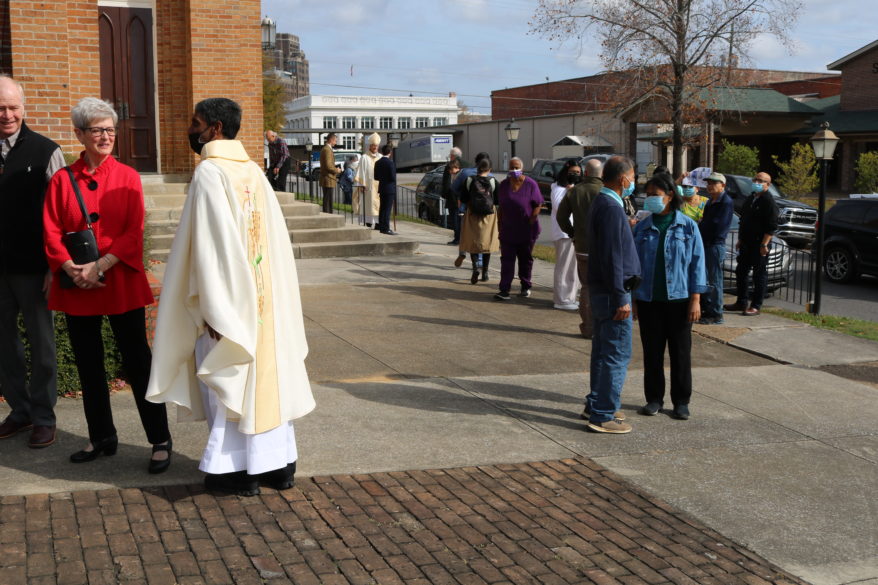
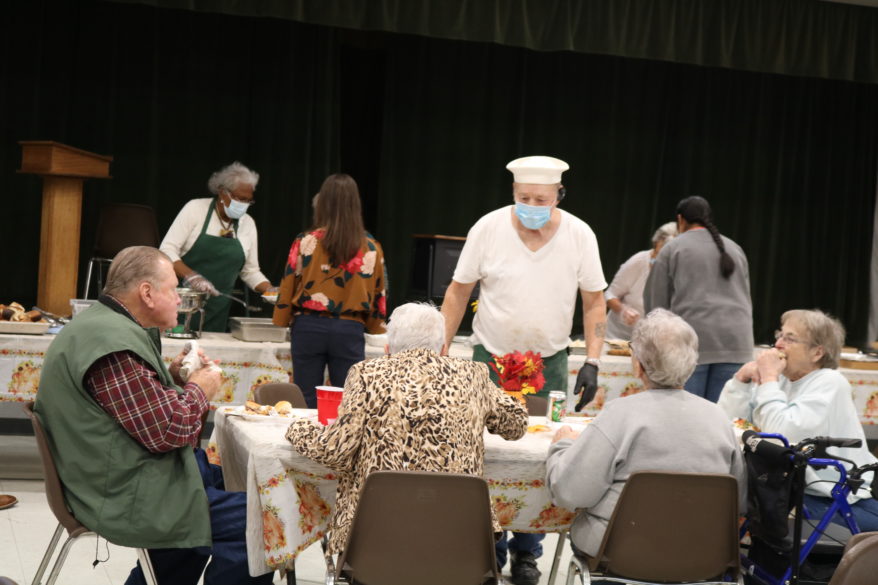
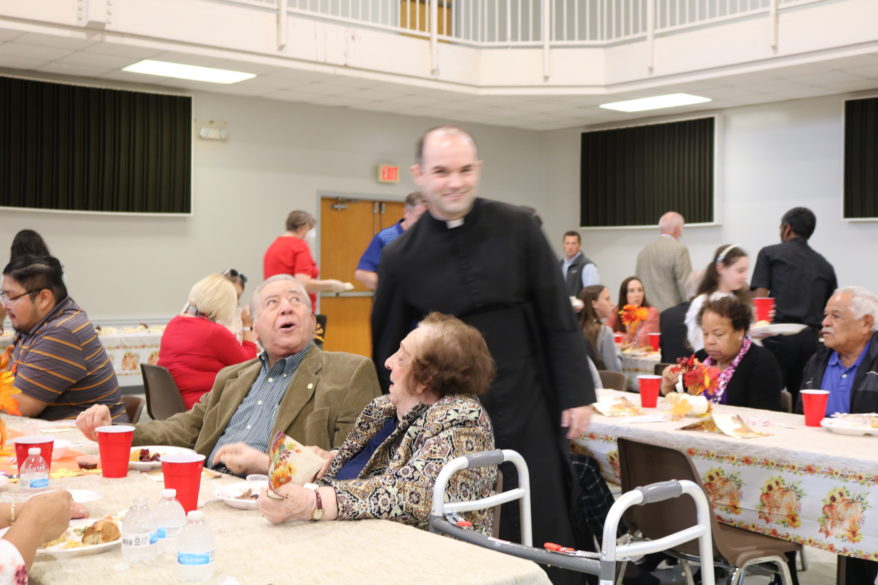
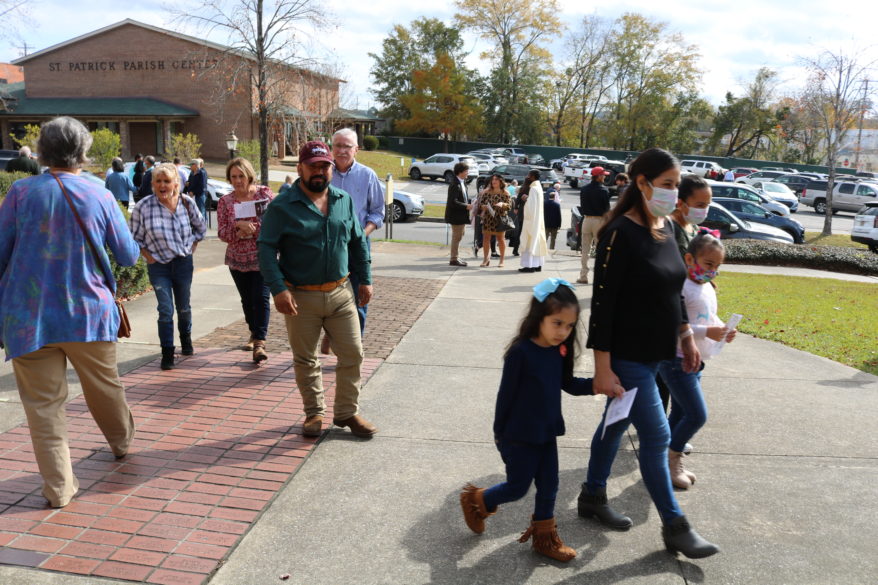

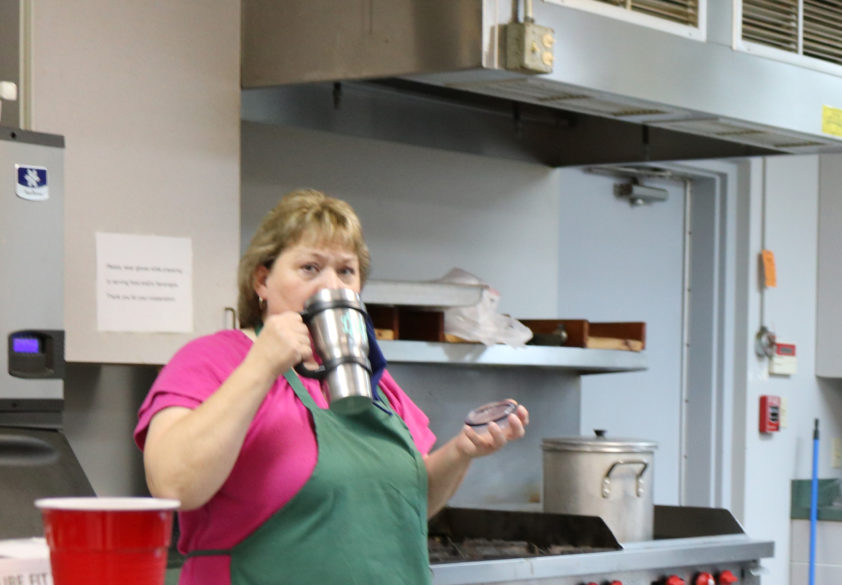
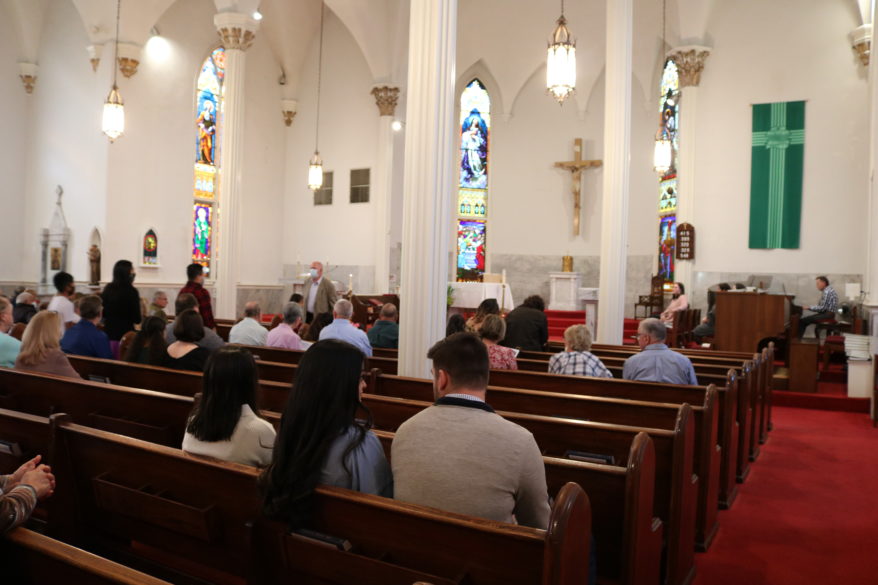
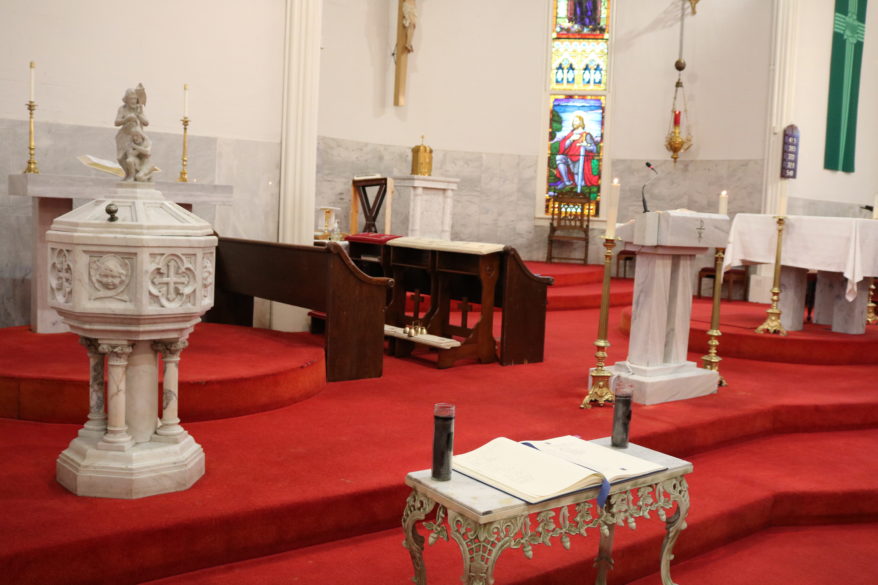
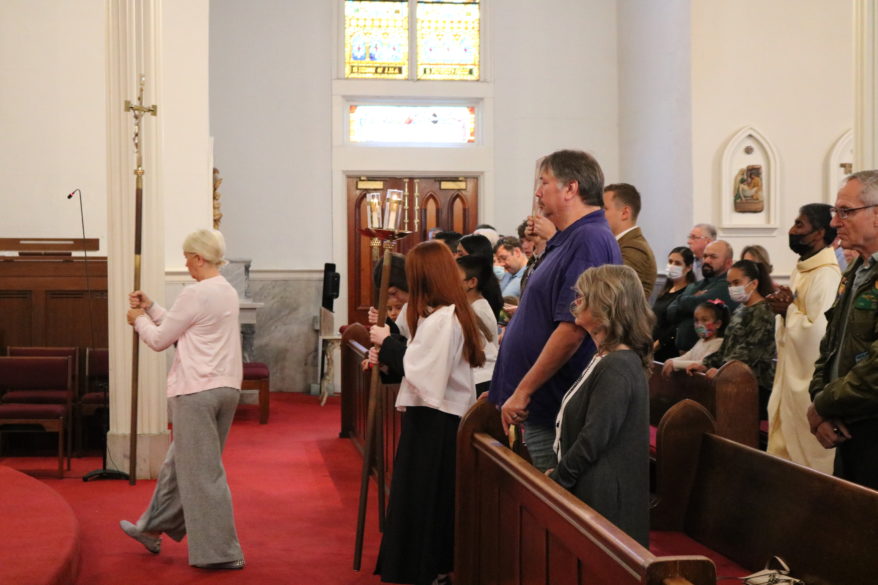
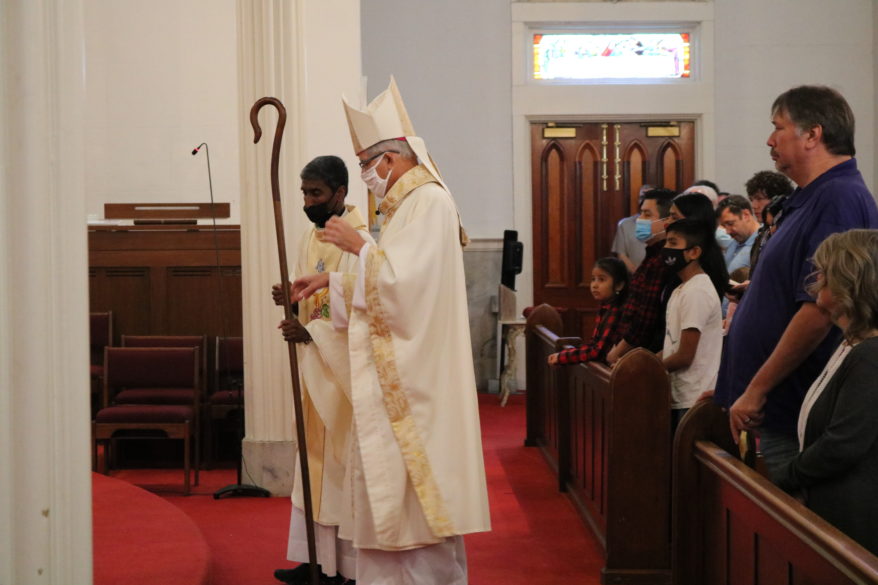
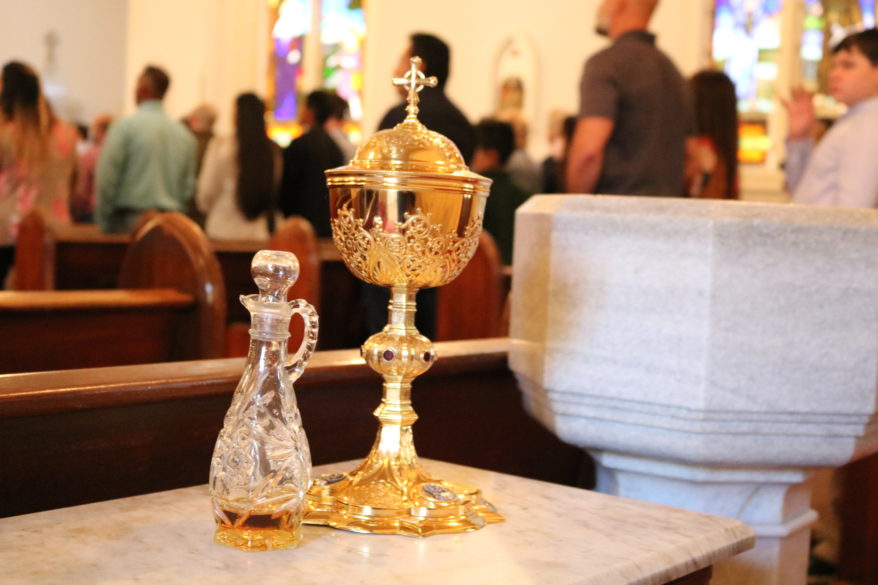
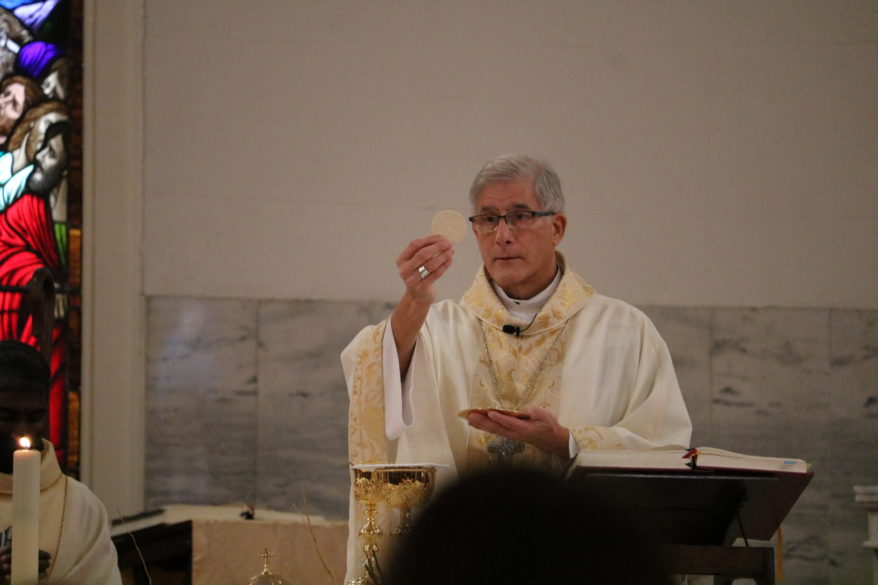
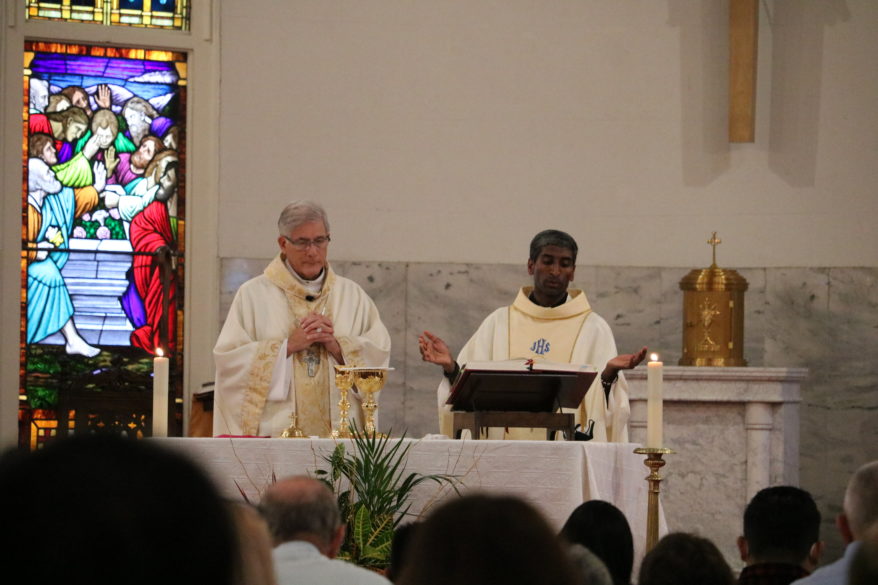
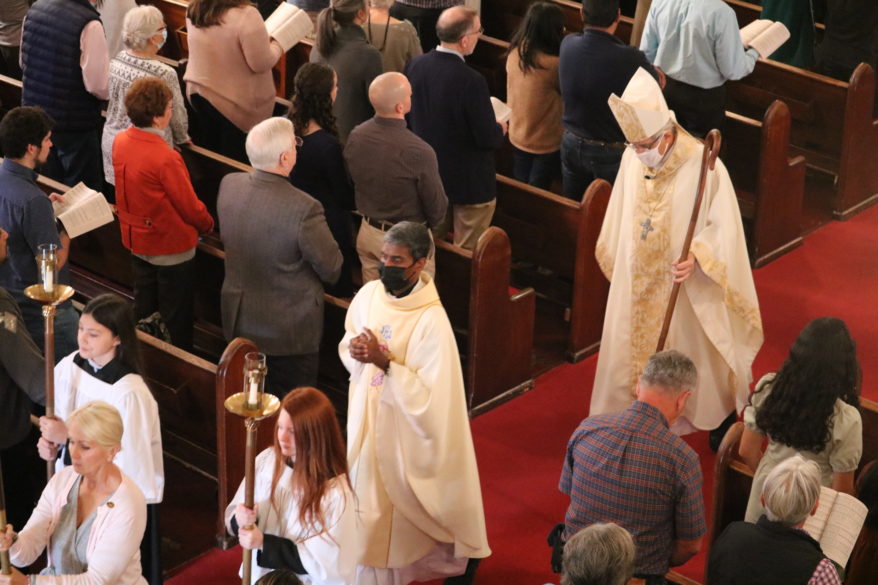
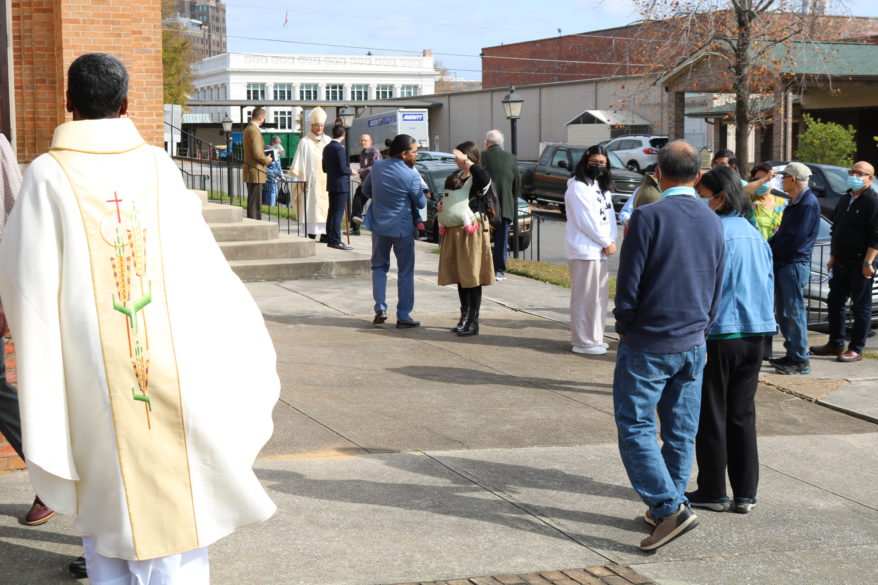
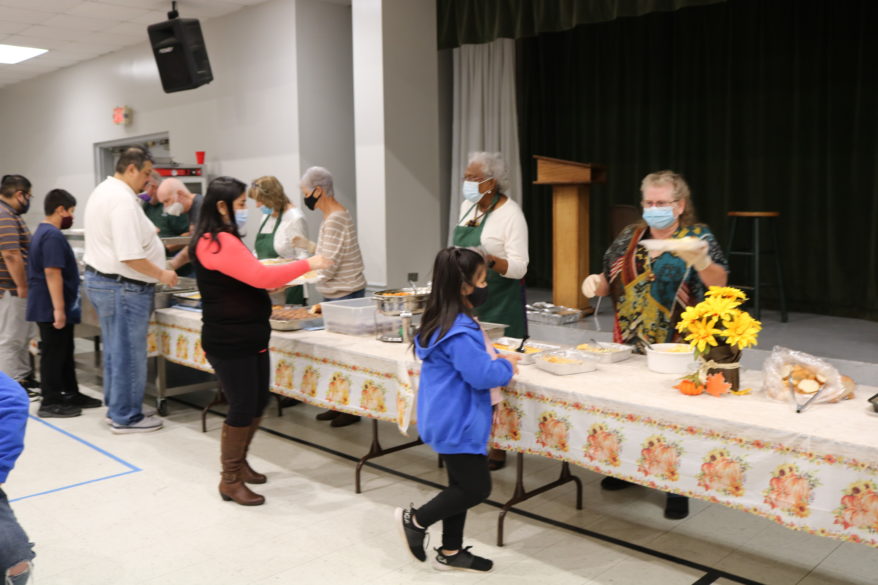
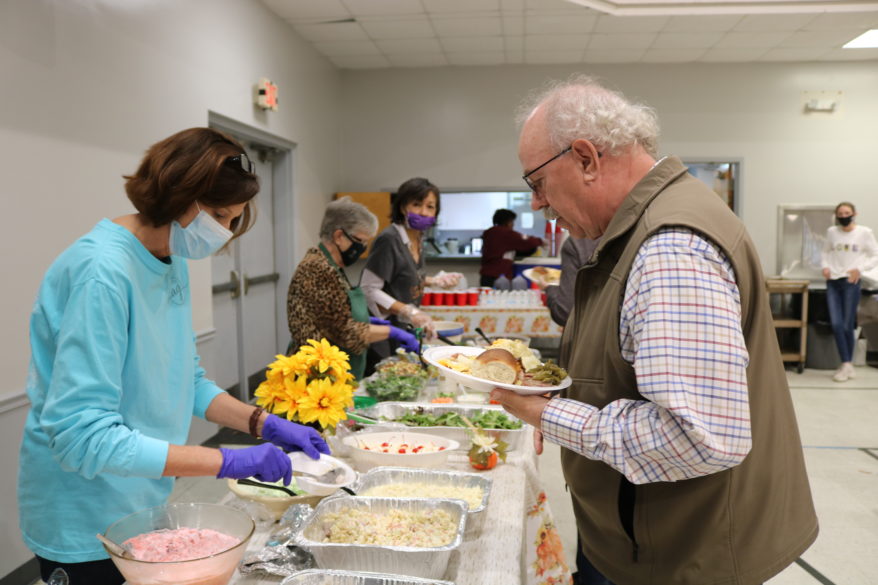
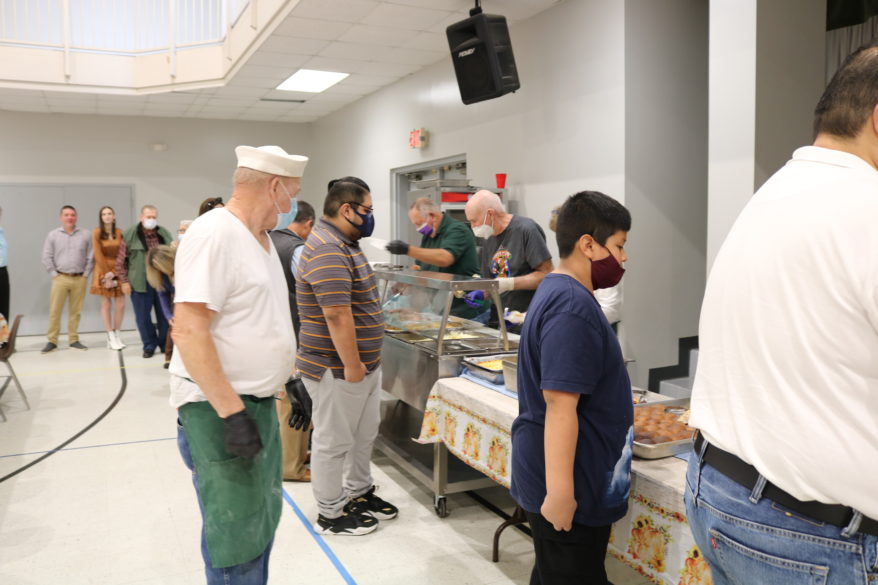
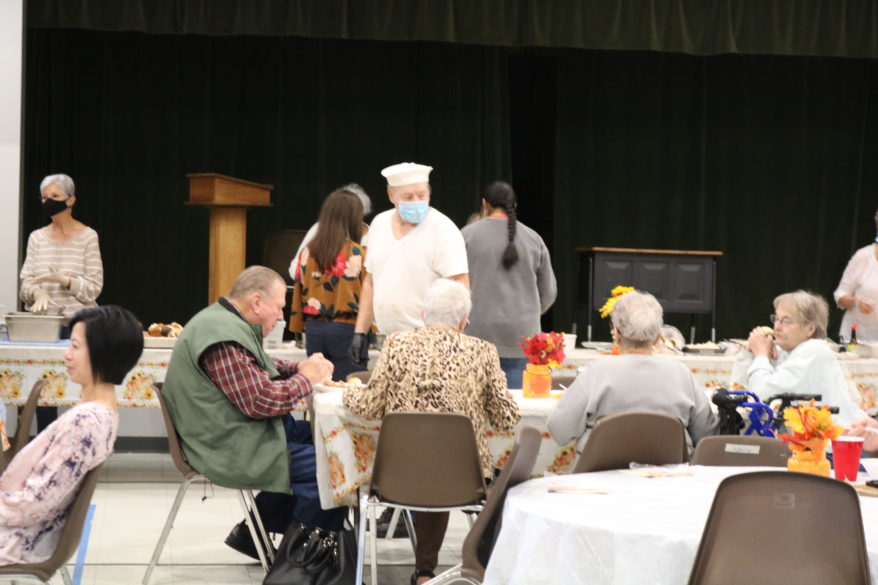
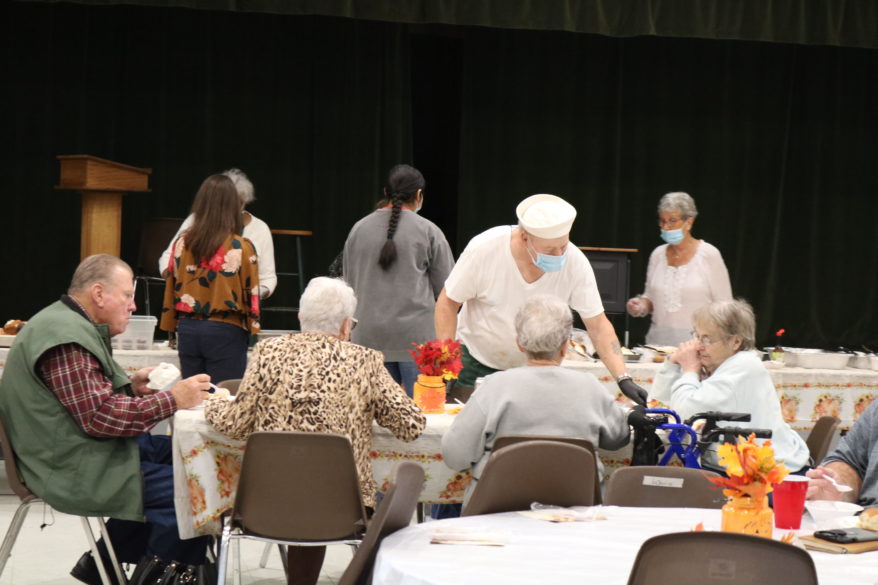
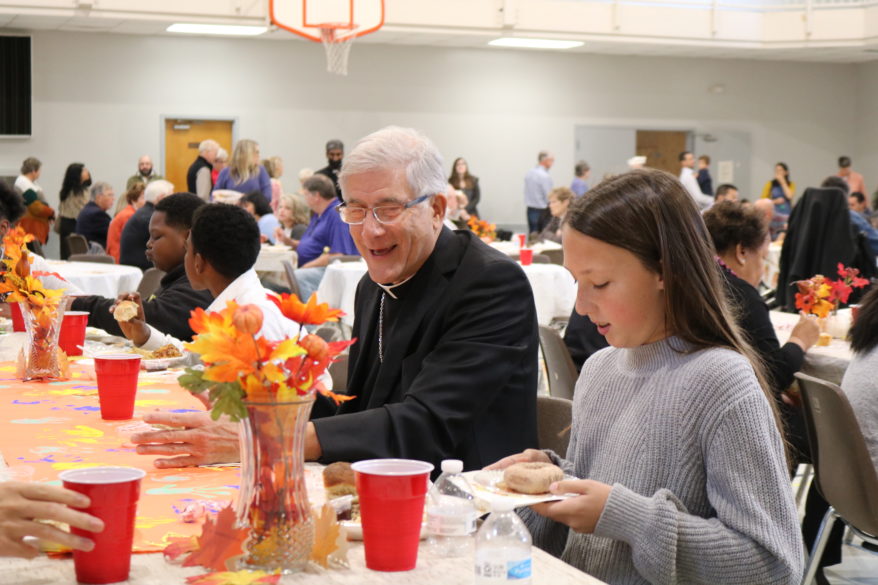
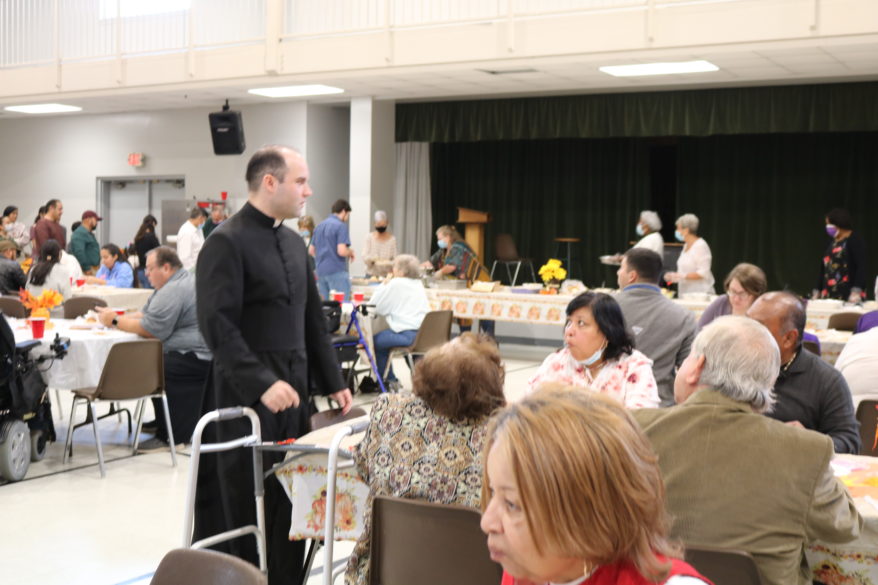
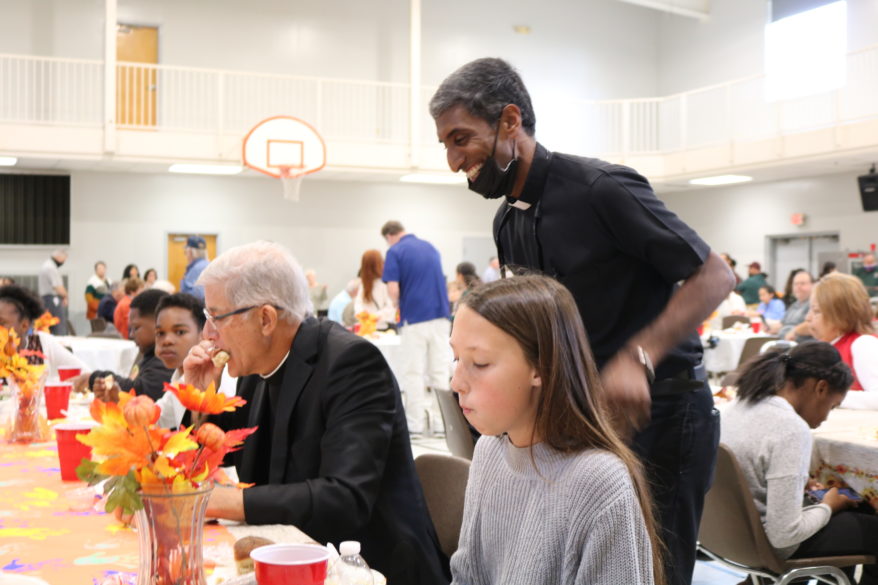
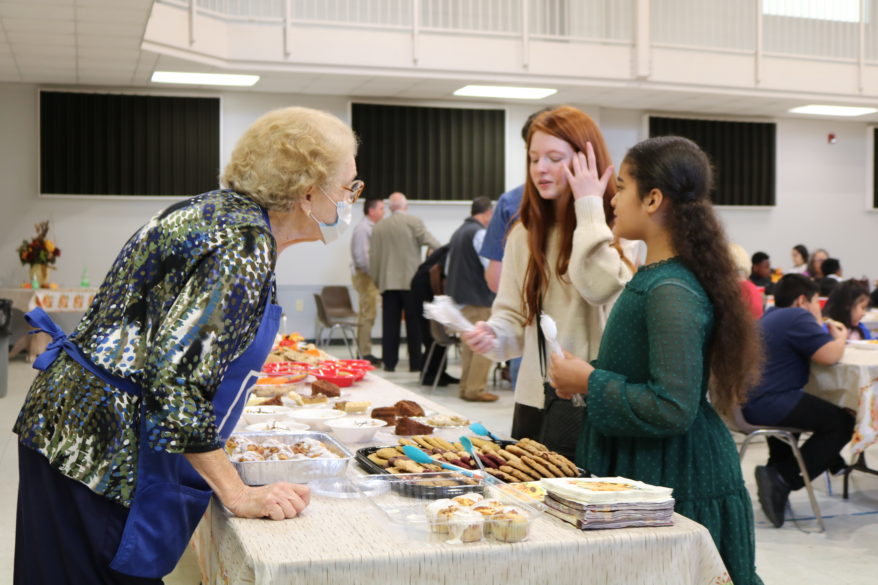
By Carol Glatz
ROME (CNS) – With Advent coming during an ongoing pandemic, Christians are called to hold on to hope and foster a season of compassion and tenderness, Pope Francis said.
During Advent this year, too, “its lights will be dimmed by the consequences of the pandemic, which still weighs heavily on our time,” he said Nov. 22. “All the more reason why we are called to question ourselves and not to lose hope.”
“The feast of the birth of Christ is not out of tune with the trial we are going through because it is the quintessential feast of compassion, the feast of tenderness. Its beauty is humble and full of human warmth,” the pope said during an audience with organizers and participants in a Christmas music contest. The contest was proposed and promoted by the Pontifical Foundation Gravissimum Educationis and Don Bosco Valdocco Missions association, based in Turin.
The contest invited people between the ages of 16 and 35 to produce new songs inspired by Christmas and its values: life, love, peace and light, according to the initiative’s website, christmascontest.it/en/. Contestants were competing in three categories: lyrics, music and interpretation, and the best three pieces will be performed during the 2021 edition of the annual Christmas concert at the Vatican.
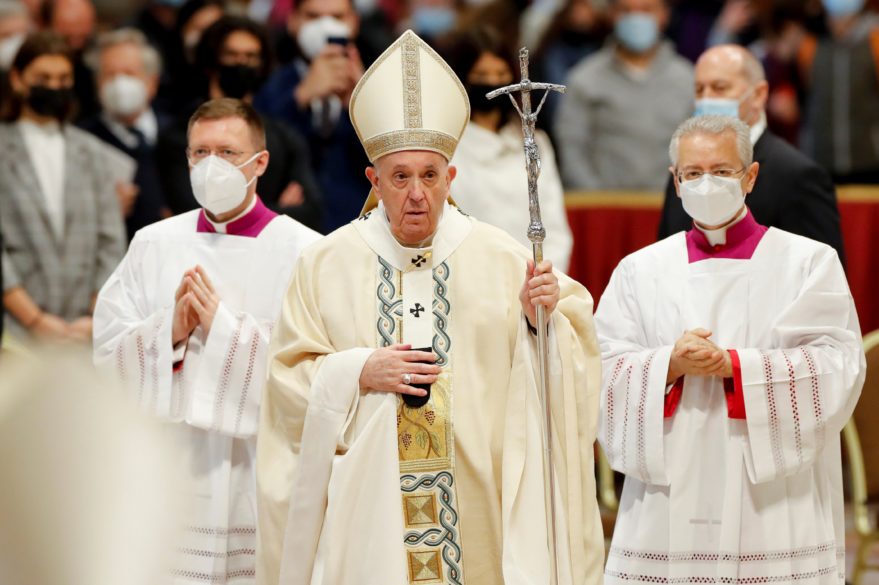
The pope thanked the groups who came up with the idea for the contest, “which gives voice to the young, inviting them to create new songs inspired by Christmas and its values.”
“The beauty of Christmas shines through in the sharing of small gestures of genuine love. It is not alienating, it is not superficial, it is not evasive,” he said.
The beauty of Christmas “expands the heart, opening it up to gratuitousness – gratuitousness, a word artists understand well! – to the giving of self,” and it can also foster cultural, social and educational life and activities, he added.
Pope Francis quoted what St. Paul VI told artists during Advent in 1965: “This world in which we live needs beauty in order not to sink into despair.”
It must not be the false beauty “made of appearances and earthly riches, which are hollow and a generator of emptiness,” Pope Francis said. It must be the real beauty “of a God made flesh, the one of faces — the beauty of faces, the beauty of stories” and the beauty of “creatures that make up our common home.”
He thanked the young people, artists and other participants “for not forgetting to be custodians of this beauty that the nativity of the Lord makes shine in every daily gesture of love, sharing and service.
IN EXILE
By Father Ron Rolheiser, OMI
I was raised in a generation that taught that God gave each of us a vocation to live out. In the religious ethos of that time, particularly in Roman Catholic spirituality, we believed that we were put on this earth with a divine plan for us, that God gave us each a special vocation to live out. Moreover, this was not something we were free to choose for ourselves; it was God-given. Our task was to discern that vocation and give ourselves over to it, even at the price of having to renounce our own dreams. We remained free to accept or not, but at a peril. To be unfaithful to your vocation meant a misguided life.
There’s an important truth in that notion, though it needs some critical nuances. First, in that spirituality, they thought of vocations in a very restrictive sense, essentially envisaging only four basic vocations: priesthood, religious life, marriage, and single life. Further, they tended to put too much gravity on the choice, namely, if you chose wrong or if you resisted your God-given vocation, it might endanger your eternal salvation. There were some unhealthy fears connected to the choice.
I saw that first-hand when I served as the provincial superior for our religious order for six years. One of my tasks was to apply to Rome for the laicization of priests leaving the priesthood. I saw how many of those leaving the priesthood had chosen that vocation under undue pressure and false fear. Their choice had not been a free one.

That being said, the old notion of vocation is essentially still true and is too easily lost in a world and culture that generally puts personal freedom above all else. We need to learn again the importance of finding one’s vocation and giving oneself over to it.
Admittedly, vocation needs to be defined more widely than choosing between priesthood, religious life, marriage, and single life. Instead, it needs to be defined as an obedience to the inner dictates of our soul, our gifts, our talents, and the non-negotiable mandate inside us to put ourselves in service to others and the world.
James Hollis, a Jungian therapist writing from a purely secular viewpoint, highlights precisely this point. “Our real desires and our destiny are not chosen for us by our ego, but by our nature and ‘the divinities.’ … Something within us knows what is right for us and its insistence on expression is what keeps us awake at night, nudges us from within during our busiest hours, or causes us to envy others. Vocation is a summons of the soul. … It’s as if we were sent to this land with a royal assignment, and if we have only dithered about and forgotten the task, then we have violated our reason for being here.” How true.
Columnist David Brooks, also speaking from a secular place, strongly agrees. A vocation, he writes, is an irrational factor wherein you hear an inner voice that is so strong that it becomes unthinkable to turn away and where you intuitively know that you don’t have a choice, but can only ask yourself, what is my responsibility here? As well, the summons to a vocation is a holy thing, something mystical, a call from the deep. Thus, discerning your vocation is not a matter of asking what you expect from life but rather what life expects from you.
What would Jesus say? As we know, Jesus was fond of teaching in parables and his parable of talents (Matthew 25 and Luke 19) is ultimately about living out one’s God-given vocation. In that parable, those who use their talents thrive and are given even more talents. Conversely, those who hide their talents are punished. In essence, the message is this: If we use our God-given talents, we will find meaning and blessing in our lives; on the other hand, if we don’t use our talents, those very gifts will snakebite us, poison our happiness, and generally embitter our spirits. Show me a man who is bitter and envious, and most times you will see a gifted man who, consciously or unconsciously, is frustrated because he has not used his talents or has used them in a manner that doesn’t serve others. Bitterness and envy are often the unhappy residue from being snake-bitten by our own unused or misused intelligence and gifts.
There’s a voice inside us issuing forth from the depths of our souls that speaks for our talents, our temperament, our unique circumstance in life, our moral and religious sensitivities, and even for our wounds. This voice is gentle, but firm and unrelenting, as it tells us that we are not free to do anything we want with our lives. We need to surrender them to something higher than ourselves.
And indeed, there’s a peril in not listening, though what’s at stake in not our eternal salvation, but our happiness and generativity on this side of eternity.
(Oblate Father Ron Rolheiser is a theologian, teacher and award-winning author. He can be contacted through his website www.ronrolheiser.com.)
Kneading Faith
By Fran Lavelle
The Year of the Eucharist was inaugurated in our diocese on the Feast of Christ the King and will be celebrated through the 2022 liturgical year. Our theme, “Stay with us, Lord,” comes from Luke’s Gospel (24:13-49) referred to as the Emmaus story.
In it we hear about two disciples, on their way to Emmaus, talking about the recent events in Jerusalem. Jesus encountered the two on the road and talked with them as they continued their journey though they did not recognize him. As night approached, they urged Jesus to stay with them. While he was at table Jesus took bread, blessed it, broke it, and gave it to them. With that their eyes were opened, and they recognized Jesus in the breaking of the bread.
Central to the Emmaus story is the journey of the two disciples. Not just the physical journey from Jerusalem to Emmaus, but the journey of faith and belief in the Risen Christ.
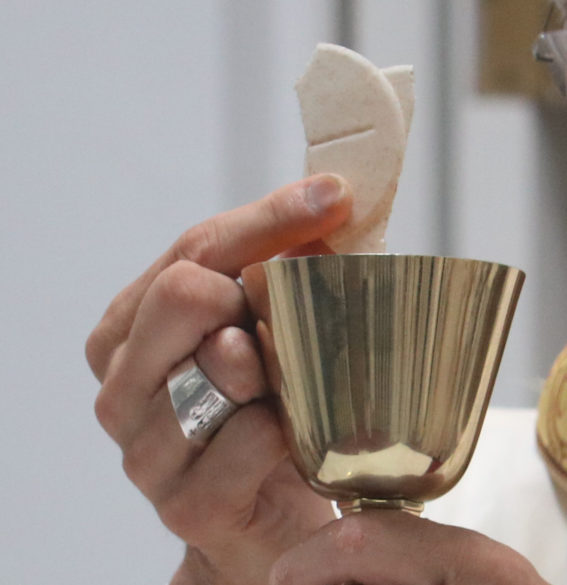
There is an old saying attributed to the Sioux Indians, “The longest journey is from your head to your heart.” This is true especially when it comes to matters of faith.
Our ability to believe in what we do not see and what we do not understand takes a lot of trust and faith. Believing in and understanding the Eucharist is one of those things that requires great faith and trust. If you have not considered your disposition at Mass when receiving Communion, I invite you to do so.
A favorite priest friend from Kentucky, would remind his congregants regularly that we need to check ourselves to make certain we are becoming more like that which we receive, that is Jesus. If our answer is no, we need to consider why not. If our answer is yes, we need to ask God for the grace to continue to be transformed by the Eucharist.
To find greater meaning in the devotional aspects of the Year of the Eucharist it is timely to focus on our personal understanding of the Eucharist. No matter how old you may be or how many years you have been a communicant, make this the year you take a deeper dive.
There are many great books written on the subject by many worthy theologians, from the Summa Theologiae, St. Thomas Aquinas to more modern studies like Alexander Schememann’s, The Eucharist: Sacrament of the Kingdom or Bishop Barron’s most recent book simply titled, Eucharist. The point is to read something that will help you to continue to be transformed by the Eucharist.
Another idea is thinking about how we are present during the Mass. When I was working on my master’s degree, I took a course on the Eucharistic prayers. Prior to that course I had never read them independent of the Mass. We did a combination of exegesis and Lectio Divina of the text. In doing so I became aware of the text in a more comprehensive way and aware of what resonated most with me. It opened a whole new understanding and way of thinking about the Eucharist for me. I remember that year wanting to use my new insights on anyone who would listen. So instead of sighing when the priest began the first Eucharist prayer thinking – dang! this is the long one – I came to appreciate the hope-filled message that each prayer uniquely conveys.
The Year of the Eucharist will take on many different forms of observation. There will be the outward devotions like Eucharistic processions, exposition and adoration, and a diocesan Eucharistic Congress. All of these are exceptionally good expressions of faith and love. But we can also take on small and personal acts that draw us closer to Jesus in the Eucharist.
For example, being aware of how we treat people in the parking lot after Mass. When I lived in Northern Virginia, I was always astounded that we needed the local police to help navigate traffic after Mass. I mean if we ever had the incentive to be kind to one another on the mean streets of Alexandria, Virginia it should have been minutes after several hundred people just received Jesus!
It is fitting that we say, “Stay with us, Lord.” Stay with us beyond the dismissal rite. Stay with us in our cars, at the restaurant during brunch, and as we enter the new week be it at school, work or home. Stay with us, Lord when we are on social media, at sporting events and in the ordinary places we find ourselves each day. Stay with us, Lord and together we can become more like you. Let the Eucharist be the mirror we hold up to see ourselves growing to be more like Jesus.
(Fran Lavelle is the Director of Faith Formation for the Diocese of Jackson.)
By Carol Zimmermann
BALTIMORE (CNS) – The U.S. bishops’ focus on the significance of the Eucharist in the life of the church isn’t just about on the statement they approved at their fall meeting.
It also is about something bigger: a three-year eucharistic revival that will culminate with the National Eucharistic Congress 2024 in Indianapolis.
The bishops approved a motion Nov. 17 during their general assembly in Baltimore to host this congress with 201 votes in favor, 17 against and five abstentions.
Auxiliary Bishop Andrew H. Cozzens of St. Paul and Minneapolis, who was recently named bishop of Crookston, Minnesota, gave the bishops details about this planned revival just before they voted on it.
The bishop, who is chairman of the U.S. Conference of Catholic Bishops’ Committee on Evangelization and Catechesis, said the revival could be a time of healing for the entire church as well as a movement of evangelization and a reawakening of understanding of the sacrament of the Eucharist for Catholics across the country.
The revival will officially start on the feast of Corpus Christi June 16, 2022, with a diocesan focus that will include eucharistic processions and other events of adoration and prayer around the country.
In 2023, the emphasis will be on parishes and resources aimed at increasing Catholics’ understanding of what the Eucharist really means.
Part of the impetus prompting this effort was a Pew study in the fall of 2019 that showed just 30% of Catholics understand the real presence of Christ in the Eucharist.
Bishop Cozzens noted the price tag for the National Eucharistic Congress – $28 million – is expensive, but said it is worth it and can be doable with fundraising.
He said many apostolates and ministries are donating time and resources to help make the eucharistic revival a reality.
Some bishops questioned the cost of the congress that wraps up this venture, but others spoke about the potential this will have to bring Catholics back to the church and bring those in the church to a deeper sense of devotion and a stronger faith.
Bishop Cozzens pointed out that such large-scale church events can be transformative and said the National Eucharistic Congress may end up being something the Catholic Church revisits 10 years from now.
Blessed Carlo Acutis will be the patron for the first year of the revival. The Italian teen, who was beatified in October 2020, died of leukemia in 2006 at age 15. He was a programmer who used social media to unite many people and spread Christian values.
In his apostolic letter proclaiming the youth “blessed,” Pope Francis said he “cultivated a friendship with our Lord Jesus, placing the Eucharist and the witness of charity at the center of his life.”
By Carol Zimmermann
BALTIMORE (CNS) – Archbishop Christophe Pierre, the apostolic nuncio to the United States, spoke to the U.S. bishops Nov. 16 about the importance of listening to people in the church and being open to the work of the Holy Spirit.
He addressed the bishops on the first day of two days of public sessions at their fall general assembly Nov. 15-18 in Baltimore.
The archbishop noted that he has been in the role of apostolic nuncio for five years and has been on a journey with the U.S. bishops through challenges of religious disaffiliation, the sexual abuse crisis, increasing secularization, polarization within the nation and the church, and most recently the global pandemic.
He quickly jumped into discussing a topic fresh on the bishops’ minds from hearing about it the previous night at their opening Mass and one they will continue discussing in preparation for an upcoming world Synod of Bishops: synodality.
“I believe that synodality is an answer to the challenges of our time and to the confrontation, which is threatening to divide this country, and which also has its echoes in the church,” Archbishop Pierre said.
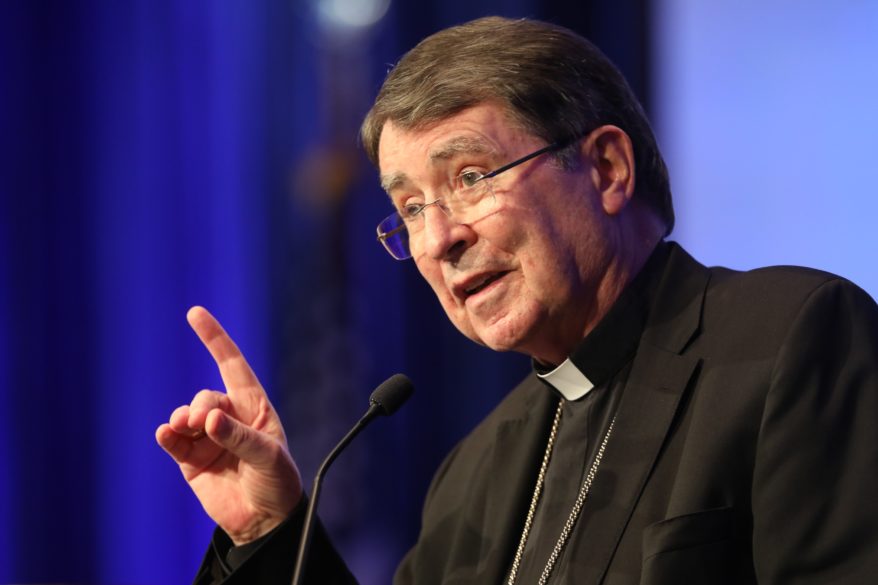
“It seems that many are unaware they are engaged in this confrontation, staking out positions, rooted in certain truths but which are isolated in the world of ideas and not applied to the reality of the lived faith experience of the people of God in their concrete situations,” he said.
To define this often-repeated word in church circles today, the nuncio explained what it is not. He said synodality is not “a meeting about meetings” and went a step further to jokingly say: “If that were the case, we would certainly be in one of the lower rings of hell in Dante’s ‘Inferno.’”
He stressed that the term – and what the church is engaged in right now in the listening phase in preparation for the 2023 synod – goes beyond the physical act of hearing people to actually being close to them.
For the bishops, he said, this process should start at home by listening to each other. “The church needs this attentive listening now more than ever if she is to overcome the polarization facing this country,” he said.
The bishops’ act of listening also is a means of leading by example to help U.S. Catholics be missionary disciples engaged in their own listening and discernment that he said should be a “way of life” in families, parishes, dioceses and on the periphery.
But for all this to happen, there also has to be overall unity because, he said, “a divided church will never lead people to where it should be.”
Throughout his half-hour address to the bishops, the nuncio continued to drive home the message that more needs to be done to bring the church to where it should be.
For example, when he mentioned that the church “should be unapologetically pro-life,” he stressed the need to look at causes and factors that lead women to seek abortions and then to reach out in practical ways to mothers in need.
Along that same line, he said the church needs to address racism and should go further with that by acknowledging “the lived reality” many in the church experience each day.
Also, regarding the Eucharist, he said people can have theological ideas about the Eucharist, which are important, but “none of these ideas compare with the reality of the eucharistic mystery, which needs to be discovered and rediscovered through the practical experience of the church, living in communion, particularly in this time of pandemic.”
The nuncio, hinting at a topic the bishops planned to address in their discussion of their proposed statement on the Eucharist, said many can “miss the true encounter” of the real presence of Christ in the Eucharist.
He also noted that there is “the temptation to treat the Eucharist as something to be offered to the privileged few rather than to seek to walk with those whose theology or discipleship is falling short, assisting them to understand and appreciate the gift of the Eucharist, and helping them to overcome their difficulties.”
Looking back and ahead, the archbishop, who was appointed U.S. nuncio in April 2016, reiterated that he and the bishops had “been on the road together for more than five years” and that they would journey forward, in unity, by “listening to one another and to the Spirit and walking with our brothers and sisters.”
“We will emerge from the present crises together,” he said, “as the church Christ has called us to be.”
NATION
BALTIMORE (CNS) – A funeral Mass was offered Nov. 23 at St. Peter Claver Church in West Baltimore for Beverly A. Carroll, a social justice advocate who spent her life raising her voice for African American Catholics in the Archdiocese of Baltimore, the United States and the world. Carroll, the founding director of the U.S. Conference of Catholic Bishops’ Secretariat for Black Catholics, died Nov. 13. She was 75. Bishop John H. Ricard, a former auxiliary bishop of Baltimore and current superior general of the Baltimore-based Josephites, celebrated the Mass for his friend. Carroll worked for many years with Bishop Ricard, who also is the retired bishop of Pensacola-Tallahassee. “She was a great advocate for the community, for the church, for African Americans in the church,” said Josephite Father Ray P. Bomberger, pastor of St. Peter Claver Parish, to which Carroll belonged her whole life. “She was interested in the church, the people of the church, what was going on, (and) how we could do it better,” he said. Father Bomberger praised Carroll’s devotion to her church, both in her home community and around the country, as well as her interest in education and social justice. Carroll was a lifelong parishioner of St. Peter Claver, where she served as a corporator and parish council member.
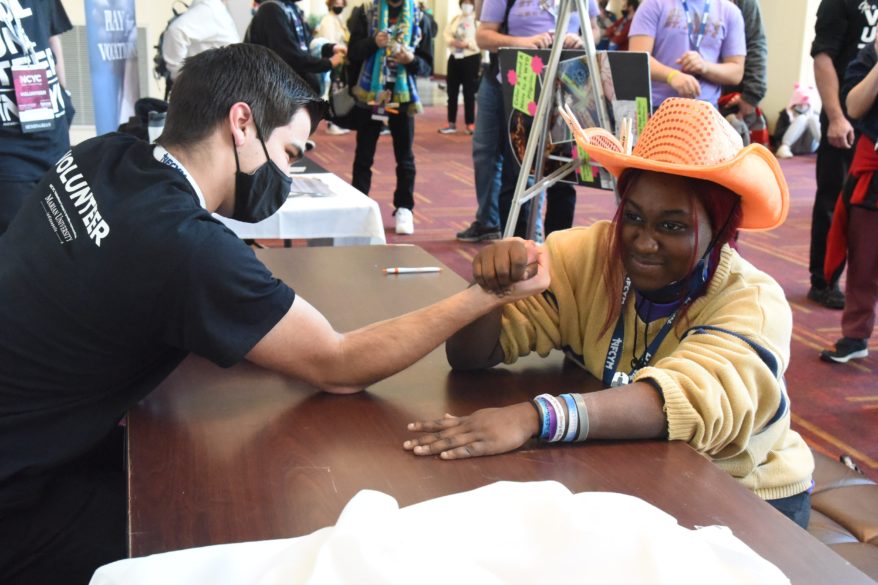
INDIANAPOLIS (CNS) – “Follow me to arm-wrestle a seminarian! See if you can beat a man who receives Communion every day!” Holding a chalk board with “Arm Wrestle a Seminarian” written on it, seminarian Samuel Hansen barked his invitation while walking through the halls of the Indiana Convention Center Nov. 20, the final day of the National Catholic Youth Conference. “It was incredibly fun,” said Hansen, a senior at Bishop Simon Bruté College Seminary and a member of St. Roch Parish, both in Indianapolis. “Just walking with the sign made a lot of people laugh. I felt like a ballpark food salesman. But it energized the convention center quite a bit.” In response to Hansen’s hawking, a steady group of challengers gathered around a table promoting vocations to the diocesan priesthood that had earlier attracted fewer visitors when the seminarians manning it waited for NCYC participants to come to them on their own. As lighthearted and winsome as his strategy to attract attention was, Hansen saw it as following in the tradition of the saints. St. John Bosco, for example, did sleight-of-hand tricks and juggling acts for kids in his village to get them to listen to his catechesis lesson. The NCYC always includes a thematic area made up of villages, or venues, in the convention hall that have traditional exhibits as well as interactive educational and recreational activities for attendees. “The saints stepped out of line and took extraordinary actions to inspire others,” Hansen told The Criterion, newspaper of the Archdiocese of Indianapolis.
VATICAN
VATICAN CITY (CNS) – Pope Francis signed a decree recognizing a miracle attributed to the intercession of Blessed Titus Brandsma, clearing the way for the canonization of the 20th-century martyr murdered at the Dachau concentration camp. The Dutch Carmelite friar was sent to Dachau for treason – after defending Jews and press freedom – and was killed with a lethal injection. The Vatican announced Pope Francis’ decision in his case and a number of other sainthood causes Nov. 25. Dachau, the notorious Nazi concentration camp in Germany most associated with the genocide of thousands of Jews during World War II, also held more than 2,700 clergy – 2,400 of them Catholic priests. Blessed Brandsma was sent there after urging editors of the Dutch Catholic press to violate a new law of the Third Reich and not print any Nazi propaganda. He also denounced Nazism as “a sewer of falsehood that must not be tolerated,” said Dianne Traflet, an assistant professor of pastoral theology and the associate dean of graduate studies at Seton Hall University in South Orange, New Jersey, during a talk at the national World War II Museum in 2018. Pope Francis also recognized a miracle attributed to the intercession of Blessed Carolina Santocanale, also known as Blessed Mary of Jesus, an Italian nun born in 1852, who founded the Congregation of the Capuchin Sisters of the Immaculate of Lourdes. The Vatican did not immediately announce dates for the canonization ceremonies.
WORLD
ANKAWA, Iraq (CNS) – Walking through this mainly Christian town outside of Irbil, the capital of Iraqi Kurdistan, it’s easy to see many changes since the victims of Islamic State militants fled here for safety seven years ago. Gone are the tents and caravans that dotted church yards and open fields to house those escaping forced conversion to Islam or death at the hands of the Islamic State militants in 2014. Colorful laundry once hung from balconies, while some people slept on church pews. The cavernous concrete skeleton of a shopping mall then sheltered 2,500 displaced people. Support from Catholic and other churches built and cordoned off rooms on three-stories; each room housed a single family, and all shared basic cooking and bathroom facilities. The unfinished structure has given way to the Ankawa Mall, where people can food shop at the French Carrefour supermarket, eat in a Turkish restaurant or buy Hello Kitty accessories at a Japanese import shop. In 2017, the Iraqi military and U.S.-led coalition troops forced out Islamic State fighters. Since then, Catholic churches and organizations have been working hard to address challenges faced by Iraq’s historic Christian community and other religious minorities. “People have faced tremendous difficulties and wounding by the Islamic State. We are still experiencing the practical effects of loss and trauma,” said Fadi, an Armenian Christian worshipping at a local church. Chaldean Catholic Archbishop Bashar Warda of Irbil stewarded the building of four schools, a university and a hospital, providing local people with badly needed employment, with assistance from Stephen Rasche, who is counsel to the Chaldean Archdiocese of Irbil.
VANCOUVER, British Columbia (CNS) – When Father Francis Galvan left Sacred Heart Church in Delta Nov. 15, he did not expect to find himself at the center of a catastrophic flood and what is being called the storm of the century. But within hours, the Augustinian priest was at ground zero of rescue efforts and witnessing humanity at its best, joining with Agassiz residents in responding to the needs of stranded travelers. “There I saw and realized how the human heart in the worst situations comes out its best – eyes looking only at those in need of help,” he told The B.C. Catholic, newspaper of the Vancouver Archdiocese, by email. Father Galvan arrived in Harrison Hot Springs only to find the study week canceled due to torrential rains, so he headed over to St. Anthony of Padua Church in Agassiz to check in with pastor Father Dennis Flores. There, the two priests saw rescue helicopters flying overhead and decided to head to the town’s community center. They found themselves in the middle of a massive rescue and relief effort. “Strong winds were blowing along with heavy rains, and I watched rescue helicopters landing, one after another,” Father Galvan said. Evacuees who had been stranded by highway mudslides emerged from the helicopters.
By Cindy Wooden
VATICAN CITY (CNS) – Despite the disappointing outcome of the COP26 summit on climate change, Pope Francis said he knows it is not too late for humanity to act to combat environment destruction and increasing poverty.
The ecological crisis, the social crisis of poverty and exclusion and the health care crisis provoked by the COVID-19 pandemic are calling out “for us to change gear, to change bad habits in order to be able to dream, co-create, and act together to realize just and equitable futures,” the pope wrote in the preface to the “Laudato Si’ Reader.”
The book, available in print and as a free e-book from the Dicastery for Promoting Integral Human Development, includes the preface from Pope Francis, a message from António Guterres, secretary-general of the United Nations, and reflections by dozens of people involved in Catholic environmental, peace or charitable agencies, ambassadors, scientists, academics, young people, farmers and Indigenous people.
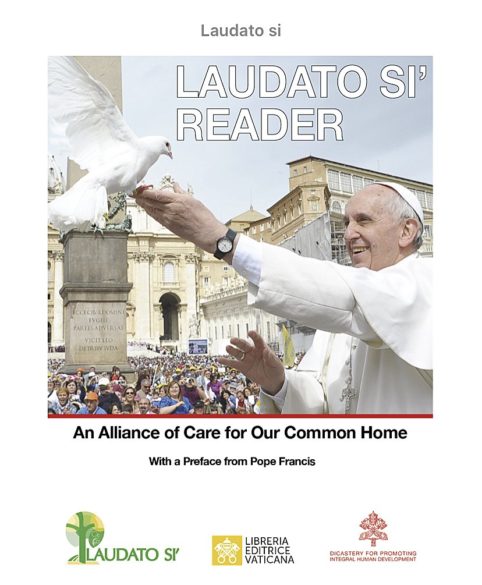
The reader, published Nov. 23, comes just over six years after the publication of Pope Francis’ encyclical, “Laudato Si’, on Care for Our Common Home.”
In his preface, Pope Francis wrote that the pandemic makes it clearer than ever that “it is time to develop a new form of universal solidarity that is grounded in fraternity, love and mutual understanding: one that values people over profit, one that seeks new ways to understand development and progress. And so, it is my hope and prayer that we do not come out of this crisis the same way we entered it!”
With so many young people so committed to fighting climate change and advocating for a more human way of organizing social and economic life, he said, “we must listen to them with open hearts. We must follow their lead, for they are wise beyond their years.”
“This is a moment to dream big, to rethink our priorities – what we value, what we want, what we seek – and re-plan our future, committing to act in our daily life on what we have dreamed of,” the pope wrote. “The time to act, and to act together, is now!”
In his message, Guterres wrote that people tend to overlook “the spiritual dimensions of the work of the United Nations,” but the values that it promotes – “peace, justice, equality, the dignity and worth of the human person – echo the teachings of the world’s religious traditions and summon us all to reduce human suffering.”
The message of Pope Francis’ encyclical is even more compelling today, he said. “Climate change has accelerated, giving the world a new normal of fires, floods and storms of epic proportions. The COVID-19 pandemic has been a grievous blow, upending lives, damaging economies and plunging families and communities into suffering and sorrow.”
“Humanity is waging war on nature,” he said, but “nature always strikes back – and is doing so with gathering fury and force.”
“Making peace with nature must be a priority for the 21st century,” Guterres wrote, and while that is an “epic policy test,” it is even more “a moral test.”
“This is a moment of truth,” he said. “If we persist with the old ways of inequality, injustice, hatred and heedless dominion over the Earth, we face disaster.”